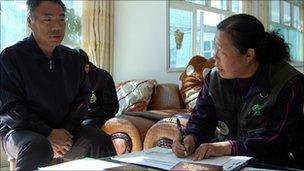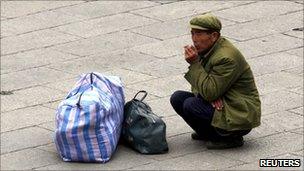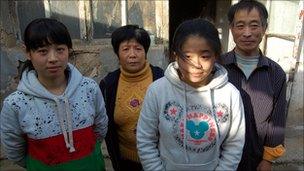Challenge ahead for China census workers
- Published
In Erhe, just outside Beijing, census workers are collecting information about the village's inhabitants.

Liu Liying is beginning the mammoth task of counting China's population
With her clipboard in hand, Liu Liying bangs on the doors of simple one-storey homes, demanding information about everyone living inside.
No detail seems too small. Do they use gas? Is there a flush toilet? Are the occupants healthy?
China has begun the mammoth task of counting every one of its citizens and recording information about their lives.
The census is usually carried out once every 10 years, but officials will face a number of extra difficulties this time round.
It will not be easy to count tens of millions of migrant workers, a floating population that often lives on the margins of society.
Families who have ignored China's strict family planning rules also face a dilemma: do they register illegal extra children?
'Needs to know'
In Erhe, on the first day of the census, Liu Liying carried out her duties with zeal.
One of the homes she visited - a pretty house with flower beds outside the front door - belonged to retired teacher Xiao Zengqin.
Ms Xiao lives in the house with her daughter. Her grandson is away studying at university in Beijing.
The census worker took about half an hour to ask a series of questions about the occupant and her home. The information will be kept secret.
The 59-year-old was happy to answer the queries. "The government needs to know this information," she said.
Catching people at home is a problem for Mrs Liu. But one group is harder to track down than most others.

Census workers say counting China's millions of migrant workers will be a real challenge
"Getting information about migrant workers is very difficult. Sometimes we don't even know who they are," said the census worker.
There could be as many as 200 million migrant workers in China.
These are people who are born and registered in the countryside, but travel to China's booming towns and cities to live and work.
Some do not bother to register in their new home and, even if they do, are often denied access to basic services, such as education for their children.
As he moved steel pipes at a building site in Beijing, worker Liao Yupeng illustrated the problem of keeping tabs on migrants.
The census workers have already been to his workplace; unfortunately he was away at another building site and so was not counted.
Banned from school
The government knows it will also have to work hard to persuade every parent in China to own up to all their children.
Many families are restricted to just one child, but some ignore the rule and have two anyway.

Li Xue is hoping that the authorities will agree to register her this time around
They face a fine if they are caught, which might put off couples who want to register their second child.
The government has promised to reduce fines for families who admit having more children than they should in this census.
Beijing couple Li Hangyu and his wife Bai Xiuling have the opposite problem. Despite wanting to, they have been unable to register their illegal second daughter, who is now 17.
They say the local authorities fear that if they register the teenager, they themselves will get into trouble for allowing her to be born in the first place.
So Li Xue is in effect a non-citizen, unable to take part in society. She is banned from going to school and is taught by her elder sister.
'Please count me'
"I watch other children going to school and see teachers taking them on outings. They have so much fun, which makes me feel very sad," she said.
The teenager has written to the authorities pleading with them to allow her to be included in this year's census.
The point of the census is not just to count how many more people have been added to China's population over the last 10 years.
As the country's leaders point out, the aim is to use this information to draw up more effective economic and social policies.
Earlier this year Premier Wen Jiabao promised to improve the lives of migrant workers, people who have helped build China's booming economy but have not shared equally in its benefits.
The final census results are due to be published in December next year; how successful it proves will be judged only after a far longer timescale.
- Published1 November 2010